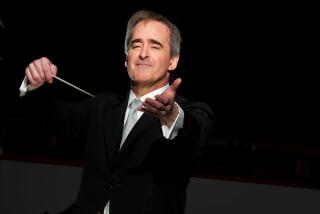Pipe Dreams
“The question you’re always asked is, ‘Is opera still relevant?’ ” says handsome young tenor on the rise Joseph Kaiser. Despite his amiable temperament, he seems peeved by the frequently posed query. And why not? Singers like Kaiser and star baritone Nathan Gunn--his strapping onstage cohort in January’s L.A. Opera production of Mozart’s The Magic Flute--are poised to lead the pack as opera flourishes in the 21st century. Emerging as a kind of Newman and Redford of the opera world, Kaiser and Gunn first teamed last year on Charles-François Gounod’s Roméo et Juliette in Kaiser’s Metropolitan Opera debut. They played opposite soprano Anna Netrebko, also hailed in the press as part of opera’s “face-lift.” Kaiser, 30, has been lauded as a rising talent whose looks earned him a place in Men’s Vogue. Gunn, 38, has been called everything from opera’s newest superstar to a “barihunk.”
“We’re the iTunes generation,” Kaiser says. “Opera at its best, in the most positive way, is an overload on the senses, because it’s just coming from all angles.” Such sensory saturation clicks well with his contemporaries, known for their penchant for mashups (mixes of diverse types of music).
On par with the iPod Shuffle generation, Gunn’s and Kaiser’s musical abilities are not limited to opera. The two double as musical-theater vocalists. Kaiser played in the Calgary Opera Company’s 2004 production of Sweeney Todd, and earlier this year, Gunn performed with an all-star cast, including Gabriel Byrne and Christopher Lloyd, in the New York Philharmonic’s Camelot.
Such range comes naturally to Gunn, who grew up with the music of Led Zeppelin, Pink Floyd and Van Halen. “If you listen to Pink Floyd’s The Wall or Dark Side of the Moon, it is operatic,” he enthuses. Yet the singer--based in Champagne, Illinois--continues to feed his other musical desires, most publicly in his 2007 CD release, Just Before Sunrise, which features songs from Tom Waits to Sting.
Kaiser explores his love of eclecticism by burning preproduction mix CDs for his colleagues, blending a favorite pastime with passion for his work. As for his Salome mix at London’s Royal Opera House earlier this year, he says, “A lot of people in the cast really enjoyed it. Or at least they said they did--maybe they were just being polite.”
Kaiser is already fantasizing about his Magic Flute mix, singling out a tune by R&B artist Kelis (of raunchy “Milkshake” fame). The tune, “Like You,” actually samples the Queen of the Night’s aria in Flute. “It’s a sweet track,” he says. Gunn, a fan of Prince (whom he calls “a genius”), will surely appreciate it, as he dreams of a collaboration with the Purple One.
Appropriately, it was around Prince’s heyday that Gunn’s love affair with opera began. He was introduced to it at 17 in South Bend, Indiana. “It captured my imagination. It pulls you in.” His vocal proclivities drew him to study music at the University of Illinois, but when it came time to dive into a niche, it was opera that courted Gunn. Steeped in a close-knit opera community, you work and you work and you wait, and then, “if you have a particular voice and you do well onstage, they find you.”
Kaiser developed a fondness for opera and diverse music as a child, driving around with his mother and listening to everything from the Rolling Stones to Georges Bizet’s Carmen. “I’ve never been in a bullfight, and I’ve never gotten into a knife fight,” he says, “but the story of Carmen is just so relevant. It’s about an obsession.”
Gunn is drawn to opera’s dramatic subject matter. “It’s all that stuff that can cause a heated argument: sex, betrayal, love triangles, revenge.” The risqué medium is perhaps not for the faint or (too) young at heart. When he taught a master class for high school students with his accompanist wife, one girl sang a Don Giovanni aria, and afterward, Gunn translated the character’s words. “What she’s saying is, ‘Beat me, spank me, I’m so bad.’ I had to explain that this opera is not G-rated. It’s definitely R.”
Quite literally in the PG realm, Kaiser starred as Tamino (the same role he has with the L.A. Opera) in Kenneth Branagh’s cinematic take on The Magic Flute. Though opera singers have always been assumed to be corpulent, the tenor decided to shed his extra baggage for the role. Inspired by actor Christian Bale’s slimdown for The Machinist, he lost 60 pounds.
When it comes to such training for Gunn, opera is a lot like sports. “If you think of singers like athletes, it’s the difference between somebody who does the Strongest Man competition and runners, who tend to be leaner.” The former would be a “Wagnerian body type” (a heavier-set singer who sustains “fewer notes that last hours and hours”), while he sees himself more as a sprinter (someone who “goes really hard for a shorter period of time”).
What Gunn lacks in portliness he makes up for in the depth of his booming voice, which has landed him such notable roles as the namesake in The Barber of Seville (which he performed at Chicago’s Lyric Opera in February 2008), and Marcello in La Bohème. He wears the baritone label like a badge of bravado. “ Elvis Presley, Frank Sinatra and Bing Crosby were baritones,” says the Beverly Sills Awardwinning singer. “I would hate to be a tenor--those guys are a little bit neurotic.”
Kaiser might beg to differ. The Canadian made the switch from baritone to tenor with his masculinity intact. The married father of two jokes, “I don’t think as opera singers we have undergarments thrown at us as much as rock stars do, but it’s something to aspire to.”
Unlike the rock ‘n’ roll world, the shelf life for male opera singers is surprisingly long. At 38, Gunn is proud and confident. “In the world of opera, I’m still considered on the young side. You don’t start singing opera as a man until you’re 35.”
David Lee Roth, eat your heart out.
More to Read
Sign up for our L.A. Times Plants newsletter
At the start of each month, get a roundup of upcoming plant-related activities and events in Southern California, along with links to tips and articles you may have missed.
You may occasionally receive promotional content from the Los Angeles Times.






